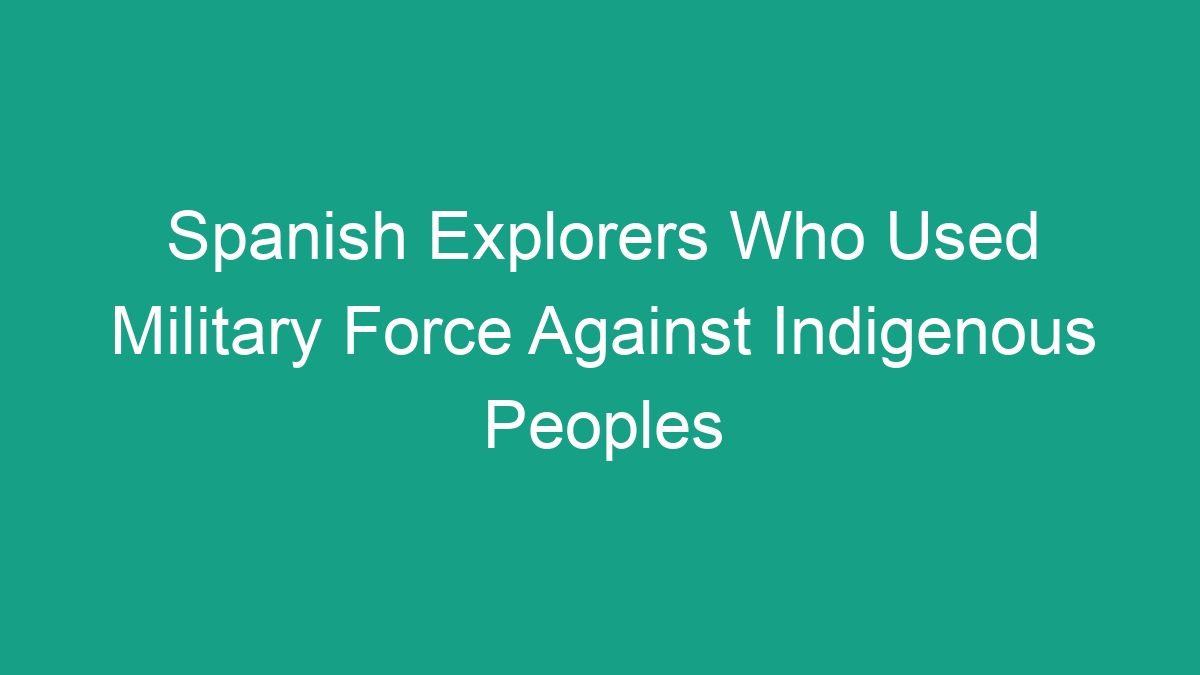
The Age of Exploration
The Age of Exploration, also known as the Age of Discovery, was a period in European history from the early 15th century to the 17th century during which several European nations sailed across the world to explore, trade, and ultimately colonize new lands. Among these explorers were the Spanish, who ventured into the Americas, encountering and interacting with the indigenous peoples of the region. While some Spanish explorers approached indigenous peoples peacefully, others used military force with devastating consequences.
Conquest of the Aztec Empire by Hernan Cortes
One of the most famous Spanish conquistadors who used military force against indigenous peoples was Hernan Cortes. In 1519, Cortes and his men arrived in the Yucatan Peninsula, and subsequently, they set out to conquer the powerful Aztec Empire. Despite being greatly outnumbered, Cortes employed superior military tactics and weaponry, as well as strategic alliances with indigenous groups who were enemies of the Aztecs. In 1521, after a long and grueling campaign, Cortes and his allies successfully toppled the Aztec Empire, leading to the eventual Spanish colonization of the region.
This conquest led to the downfall of the Aztec civilization and the subsequent subjugation of the indigenous people under Spanish rule. The use of military force by Cortes and his men resulted in the loss of countless lives and irreparable damage to the vibrant Aztec society.
Francisco Pizarro and the Fall of the Inca Empire
Another Spanish explorer who used military force against indigenous peoples was Francisco Pizarro. In 1532, Pizarro led an expedition to the Inca Empire in present-day Peru. Like Cortes, Pizarro utilized advanced military tactics and weapons to conquer the Inca forces. Pizarro also took advantage of internal strife among the Incas, exploiting existing tensions to further weaken their resistance.
The fall of the Inca Empire at the hands of Pizarro and his men resulted in the loss of thousands of lives and the destruction of an advanced and sophisticated indigenous civilization.
Effects of Spanish Conquest on Indigenous Peoples
The use of military force by Spanish explorers against indigenous peoples had lasting and devastating effects. The conquests led to the forced conversion of indigenous people to Christianity, the imposition of Spanish culture and laws, and the exploitation of indigenous labor and resources. Millions of indigenous people died as a result of warfare, disease, and harsh treatment under Spanish colonial rule.
The impact of Spanish conquest on indigenous societies was profound, leading to widespread depopulation, cultural destruction, and the marginalization of indigenous traditions and languages. The legacy of Spanish conquest continues to affect indigenous communities in the Americas to this day.
Resistance and Resilience of Indigenous Peoples
Despite the overwhelming odds they faced, many indigenous groups fiercely resisted Spanish conquest. They mounted armed revolts, engaged in guerrilla warfare, and sought refuge in remote and inaccessible regions. Some indigenous leaders, such as the legendary Túpac Amaru, organized large-scale uprisings against the Spanish, although these ultimately proved unsuccessful.
Indigenous peoples also demonstrated resilience in preserving their cultural traditions, languages, and spiritual beliefs in the face of Spanish domination. Today, many indigenous communities continue to assert their rights and strive for recognition and justice.
Reevaluating Spanish Conquests
In recent years, there has been a growing movement to reevaluate the legacy of Spanish conquest in the Americas. Historians and scholars are increasingly highlighting the atrocities committed by Spanish explorers and the impact of colonization on indigenous peoples. Efforts are being made to recognize and commemorate the resilience and contributions of indigenous peoples, as well as to address ongoing issues of inequality and discrimination.
It is important to acknowledge the darker aspects of history and work towards reconciliation and healing. By acknowledging the harm caused by Spanish conquistadors and honoring the resilience of indigenous peoples, we can strive towards a more equitable and inclusive society.
Conclusion
The Spanish explorers who used military force against indigenous peoples during the Age of Exploration left a lasting and tragic impact on the Americas. The conquests led to the subjugation, exploitation, and decimation of indigenous societies, and the effects continue to be felt to this day. It is essential to recognize the profound injustices that occurred and work towards addressing the legacies of colonization. By learning from the past and elevating indigenous voices, we can move towards a more just and equitable future.



